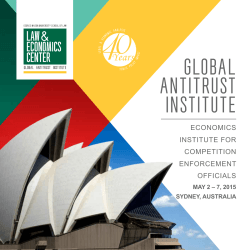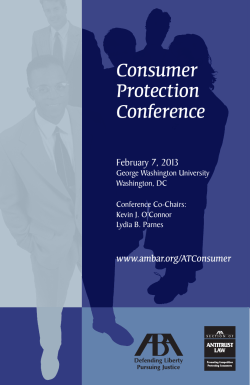
Antitrust Law & Trade Regulation
Antitrust Law & Trade Regulation Summer 2014 – ECON 3090 Section 092 Monday, Tuesday, & Thursday 6:00 - 8:30 Classroom: Friday 107 Jonathan Perry Office Information: Union County District Attorney's Office - Monroe 369-I Cone Center, Honors Office UNC Charlotte Phone: 704-654-5555; 704-698-3192 Email Contact: jwperry@uncc.edu Office Hours: after class when available and making arrangements prior to the class meeting Description of the Course: This course will examine the legal framework regulating the operation of the competitive market in the United States and North Carolina. The recent financial crisis has resulted in a growing public discussion of the nature of government regulation of the free market, and students will learn about the general purpose, historical background, and current applicability of antitrust law in the modern economy. Law and economic theory will be discussed equally throughout this course, drawing on the industrial organization literature in economics as well as antitrust law. Students will ask and answer questions related to regulation of business behavior, the operation of the price mechanism and free markets, and monopolies and cartels. In this course, students will learn the tools that regulators have available in their kits used to understand the business environment, from measurements of market structure to market concentration and monopoly power. We will also study anticompetitive behavior and the exceptions to antitrust regulation, as well as assess the ability of the law to keep up with new technologies and business practices. COURSE POLICIES DIVERSITY STATEMENT: The Belk College of Business strives to create an inclusive academic climate in which the dignity of all individuals is respected and maintained. Therefore, we celebrate diversity that includes, but is not limited to ability/disability, age, culture, ethnicity, gender, language, race, religion, sexual orientation, and socio-economic status. ACADEMIC INTEGRITY: Students have the responsibility to know and observe the requirements of The UNCC Code of Student Academic Integrity. This code forbids cheating, fabrication or falsification of information, multiple submission of academic work, plagiarism, abuse of academic materials, and complicity in academic dishonesty. Any special requirements or permission regarding academic integrity in this course will be stated by the instructor, and are binding on the students. Academic evaluations in this course include a judgment that the student's work is free from academic dishonesty of any type, and grades in this course therefore should be and will be adversely affected by academic dishonesty. Students who violate the code can be expelled from UNCC. This normal penalty for a first offense is zero credit on the work involving dishonesty and further substantial reduction of the course grade. In almost all cases the course grade is reduced to F. Copies of the code can be obtained from the Dean of Students Office. Standards of academic integrity will be enforced in this course. Students are expected to report cases of academic dishonesty to the course instructor ATTENDANCE: Attendance is mandatory, and I will take attendance at the beginning of every class. You may not miss classes without suffering the consequences set forth in the Student Rights and Responsibilities Manual. Come to class on time for a number of reasons, not least as a courtesy to your fellow students and me. I reserve the right to consider you absent if you are not present when I take attendance at the beginning of class. PLEASE ARRIVE ON TIME - there will be times when I am NOT able to arrive exactly on time and there will be activities for you to complete before I arrive facilitated by our unofficial TA students. CLASS PARTICIPATION: I expect you to have done the assigned reading and to be fully prepared to participate. You should not hesitate to ask questions or contribute to any ongoing discussion. I will not hesitate to prompt those of you who are less forthcoming. You may earn points on your final grade for outstanding participation, and I reserve the right to deduct points from your final grade if you are repeatedly unprepared, excessively tardy or simply do not participate. Also - this class will involve discussion and exchange of ideas; this is to be carried out in a respectful, courteous, and non-chaotic manner. LAPTOPS: Students who take notes on a computer frequently fall into the trap of transcribing the lecture...It is also very easy to become distracted by e-mail or instant messaging, the Internet, or other computer applications and to miss what is happening in the classroom. Students have told me in prior semesters that having fellow students around them on e-mail, IM, Facebook, and the Internet is distracting and disruptive. In addition, I have noticed that students who are using the Internet frequently ask me to repeat what I have said, which slows us down as a class. For that reason, do not use the Internet (including IM and e-mail applications) in class. Violations will be penalized as noted above for lack of class participation. To be clear: Laptops should NOT be used unless authorized for class activities. PLEASE SEE ME IF THIS PRESENTS A PROBLEM. Since this is a seminar class and notes will often involve drawing and graphs, laptops will be of limited utility anyway. PHONES: Except in the case of emergency, please turn cell phones to silent mode prior to class. If an emergency requires you to keep your phone on ring, please let me know prior to class. RECORDING CLASS SESSIONS: Not Allowed. See me if you have questions about this. Textbooks(s): (1) The Antitrust Laws: A Primer [4th Edition] John H. Shenefield & Irwin M. Stelzer, 2001 The American Enterprise Institute Press ISBN# 0844739421 THIS TEXT AVAILABLE ONLINE: http://www.aei.org/files/2001/12/01/20040217_book14.pdf (2) Antitrust: The Case for Repeal [Revised 2nd Edition] Dominick T. Armentano, 1999 The Ludwig von Mises Institute ISBN# 0945466250 THIS TEXT AVAILABLE ONLINE: http://library.mises.org/books/Dominick Armentano/Antitrust The Case for Repeal.pdf (3) Free Markets Under Siege: Cartels, Politics, & Social Welfare Richard A. Epstein, 2005 Hoover Institution Press ISBN# 0817946128 THIS TEXT AVAILABLE ONLINE: http://www.hoover.org/publications/books/8346 Additional Articles/Cases: To be provided... Course Notes From Professor: To be provided via Moodle / Email Course Evaluation: assessments will include: 1. Student Participation/Short Writing Assignments (30%): Each student will be responsible for participating throughout the course of the semester in several in-class exercises and short writing assignments, which will be geared towards helping you understand the basics of markets and their regulation. These short assignments will include: a. Short writing exercises (SWE's) (1-2 pages) (20%). These are short essay responses to questions on one specific topic b. Additional Classroom Economics Exercise(s) & Participation (10%). We will have several exercises in class that will require you to participate; points will also be awarded for great efforts put forth! 2. First & Second Written Assessments (30%) - these will be take home, open book and notes written assessments with several days to respond to the questions posed. I expect these written assessments to be at a minimum several pages each. 3. Final Essay/Brief (25%) - This will be an analysis of a current case from the world of antitrust litigation, and for the assignment you will be asked to apply the principles of both antitrust and economics to assess a particular point of view expressed through the briefs and other supporting documentation. 4. "Issue" Presentation (15%) - we will have three distinct areas of the law and economics within the class that are suitable for discussion and presentations - (1) the Microsoft case; (2) the Financial Crisis; and (3) the overall efficacy role of regulation in the economy. Students will be broken into small groups and for their topic on the night it is discussed will be responsible for a brief presentation and leading some of the discussion. Course Assignments - Summer 2014 Date Topic Reading Assignment / Class Activity-Assignment 7/1 Introduction to the course; discussion of syllabus and assignments; discussion Fair Fight In the Marketplace OBJECTIVES: To understand the purposes of studying antitrust law and trade regulation; understand some basic ideas about the field. Antitrust Worldview, Part I 7/3 The Origins and Objectives of Antitrust Law & Trade Regulation: Fundamental statutes, institutions, and procedures of antitrust law OBJECTIVES: To understand where the antitrust law comes from and its purposes; understand the debate over the fundamental question(s) of economics & how they relate to trade regulation law Class Seat Auction Exercise Epstein Armentano 1 Shenefield 1,2,3,4 KEY TERMS: Sherman Act; Clayton Act; Federal Trade Commission Act; 7/7 Economics & Antitrust OBJECTIVES: To understand how economic theory and tools help illuminate the relationship between the government and the market; what economic theory can tell us about how markets work (normatively and positively) Armentano 3 Shenefield 5 Adam Smith: Wealth of Nations KEY TERMS: Industrial Organization; Game Theory; 7/14 Markets & Market Power Armentano 3 Shenefield 5 OBJECTIVES: To understand how the law defines markets, and market power KEY TERMS: Market Power; HHI; 7/15 Monopolization & Monopolistic Behavior Armentano 4 Shenefield 6 OBJECTIVES: To understand how firms can act in unacceptable antitrust lawdefined ways; to define what monopolies do and why they are controversial KEY TERMS:; Monopolization; 7/17 7/21 7/22 Presentations/Class Discussion: US v. Microsoft Presentations Compliance With Antitrust Law OBJECTIVES: To understand how businesses put in place procedures to ensure compliance with the antitrust laws GUEST SPEAKER: TBA Collusion & Joint Behavior (A Firm & Other Firms) Armentano 6 Shenefield 7,8 OBJECTIVES: To understand regulation of the firm's relationship with other firms in the market(s) Airline Pricing exercise KEY TERMS: Price-fixing; Market Division; Horizontal Agreements Shenefield 13 7/24 Firms & The Consumer Armentano 5 Shenefield 9 OBJECTIVES: To understand regulation of the firm's relationship with consumers KEY TERMS: Vertical restraints; Price Discrimination; 7/28 Trade Regulation & The Financial Crisis OBJECTIVES: To understand what role trade regulation law has played in the context of the financial crisis Inside Job 7/29 Trade Regulation & The Financial Crisis, Continued Presentations 7/31 Antitrust Law & Intellectual Property 8/4 OBJECTIVES: To understand how antitrust law affects intellectual property and business-related activities Shenefield 10 State & Private Antitrust Enforcement Action(s) Shenefield 11 OBJECTIVES: To understand how the states and private individuals play roles in the regulation of trade 8/5 Final Considerations: The Role of the Government & Regulation of the Market Presentations OBJECTIVES: To assess where the antitrust and trade regulation laws leave us in terms of their goals and operation; how well are free markets reined in by the government, in terms of appropriateness and overall efficiency? 8/8 NO CLASS FINAL EXAMINATION/ESSAY DUE Armentano Denotes chapters that can be found in Antitrust: The Case for Repeal Epstein Denotes chapters in Free Markets Under Siege Shenefield Denotes chapters that can be found in The Antitrust Laws: A Primer
© Copyright 2025














